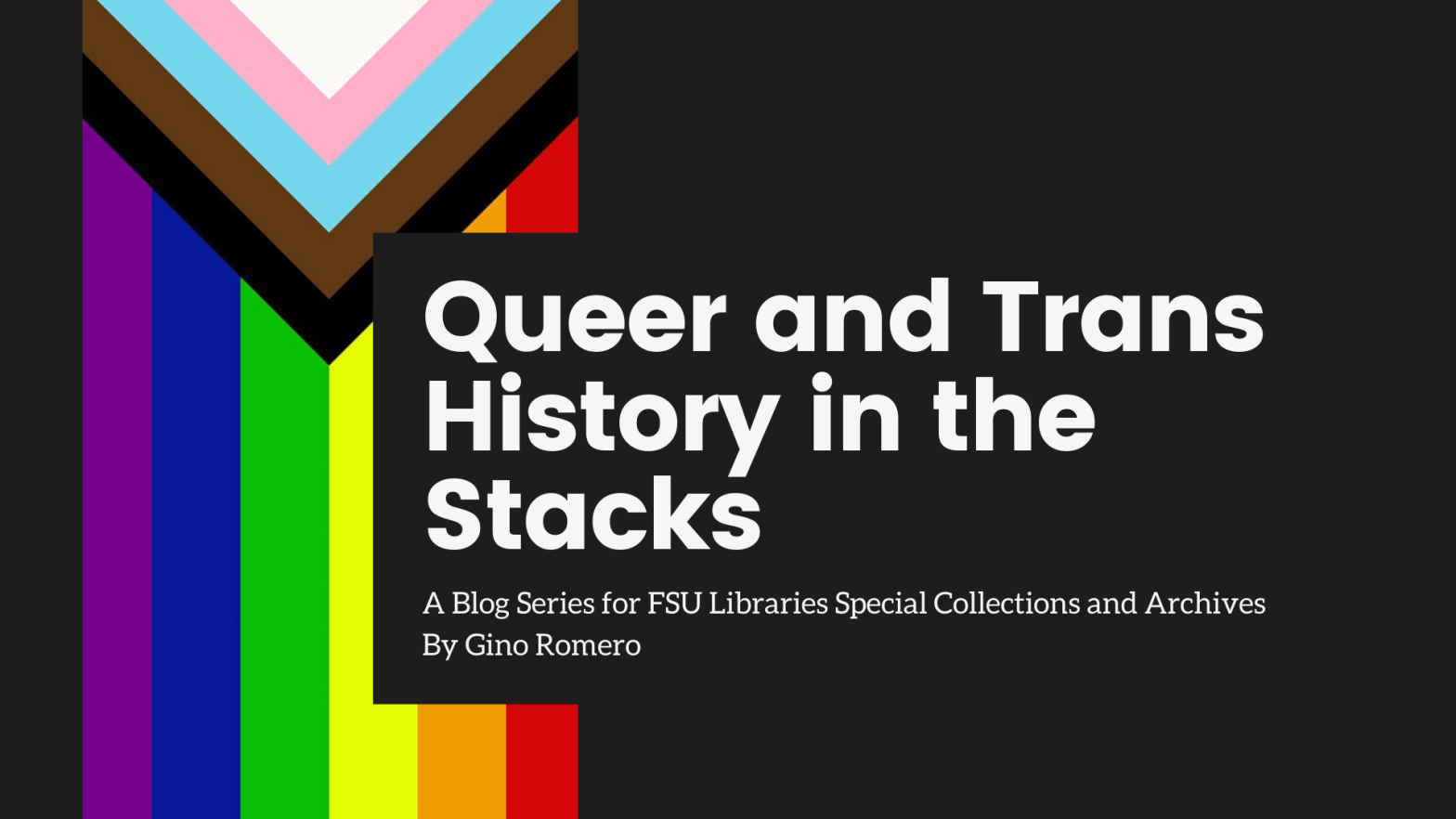Lately I’ve been thinking about search bars. We have them on our computers, our phones, and our websites. Library websites have a lot of search bars. How are these little boxes able to deliver results for materials? So how does a search for library materials work? There’s three main components to a search system: theContinue reading “Catalogs (how do they work?)”
Tag Archives: cataloging
TRANSforming the Stacks
***Trigger Warning: trans slurs/derogatory terms*** Our first submission is from Kacee Reguera, a recently-graduated student worker, who has been with Special collections for 2 years. While this project was geared towards the full-time staff, I chose to highlight her contribution first because I’m happy to see this conversation being engaged with by everyoneContinue reading “TRANSforming the Stacks”
LGBTQ+ in Rare Books and Manuscripts: A Pride Month Project Becomes a Blog Series!
Hello! My name is Gino Romero. As a student, it was comforting to know that it wasn’t just me, that the institution was also struggling to find these histories. But as a researcher, I was frustrated beyond reason. I wondered why it’s so hard to find these histories. Now I work in Special Collections andContinue reading “LGBTQ+ in Rare Books and Manuscripts: A Pride Month Project Becomes a Blog Series!”
The Library of Babel and Special Collections
The following is a guest post by student assistant Blaise Denton. Here in the Florida State University Special Collections we have a very special volume, Jorge Borges “The Library of Babel.” The standalone volume in our possession is illustrated by Erik Desmazieres. The Book details life in the great and infinite Library of Babel. ItContinue reading “The Library of Babel and Special Collections”
A Question for Complex Cataloging
Catalogers work behind the scenes in the library. We’re usually found in our very quiet building, examining books, checking over bibliographic records, or typing lines of code. The catalog records that we work on are mostly used by people whom we will never meet. But the Cataloging & Description department occasionally receives questions from researchers,Continue reading “A Question for Complex Cataloging”
A Visit from the “‘Twas the Night” Collection
‘Twas the week before Christmas, when all through our section We were ready to work on a festive collection. Many boxes of books (and this part makes it fun), Each with the same poem. You all know which one. The boxes were nestled all snug in their cart, Holding old books and rare books andContinue reading “A Visit from the “‘Twas the Night” Collection”
Cataloging Historic Student Work
As FSU students were finishing up their final papers for the semester, at Complex Cataloging we were working on a group of theses and dissertations written by FSU students long ago. Our project involved almost 600 digitized works from graduate and undergraduate students, most of them written between 1920 and 1979. Electronic theses and dissertationsContinue reading “Cataloging Historic Student Work”
Bound with Trouble: A Cataloging Mystery
Have you ever wondered how a book is cataloged or who constructs the records that allow you to find a resource within the library? If so, then today is your lucky day. Special Collections’ Complex Cataloging Unit created a Film Noir short on the cataloging process. Directed, filmed, and edited by Dominique Bortmas, Complex CatalogingContinue reading “Bound with Trouble: A Cataloging Mystery”
Cataloging Clues: Book Owner’s Letter Provides Insight into Napoleon Collection Item
Today in Special Collections, we are exploring a new addition to the Napoleon Collection which led catalogers on an interesting research journey. Recently, a book titled The Historical and Unrevealed Memoirs of the Political and Private Life of Napoleon Buonaparte, printed in 1821, found its way into Special Collections’ Napoleon Collection. While the text itselfContinue reading “Cataloging Clues: Book Owner’s Letter Provides Insight into Napoleon Collection Item”
Cataloging and Description: A New Era
We continue our introductions of the FSU Special Collections & Archives division with the Cataloging and Description department. This post was written by Amy Weiss, Annie Glerum and Ruth Ziegler. The Cataloging and Description Department supports the academic programs of Florida State University by organizing and describing print books, e-books, video recordings, streaming video, microforms,Continue reading “Cataloging and Description: A New Era”
